The mere mention of stress can instantly trigger heightened responses within us. Stress is something we all encounter in our lives, and for some, it’s a daily companion on a chronic level. What many may not realize is that stress can have adverse effects on our overall health, including our skin. This creates a vicious cycle as the visible effects of stress on our skin can, in turn, contribute to more stress.
Why does stress have such an impact on our health, including our skin? Let’s explore the relationship between stress, chronic stress, and skin issues.
Understanding Chronic Stress

Stress isn’t always harmful; in fact, it’s designed as an adaptive mechanism for our well-being. As far back as 1946, the renowned endocrinologist Hans Selye demonstrated through research that our body’s response to stressful stimuli follows a three-stage process he called the “general adaptation syndrome.”
These three stages are:
- The Alarm Stage: This initial reaction triggers your brain to prepare for defense, often manifesting as the “fight or flight” response, driven by adrenaline.
- The Stage of Resistance or Adaptation: In this stage, your defenses are fully engaged, and various hormones, including cortisol (commonly known as the stress hormone), are released to continue the battle.
- The Stage of Exhaustion: In the third stage, the cumulative stress and hormone levels reach a peak that the body can no longer withstand or compensate for. This results in a disruption of the body’s homeostasis or the onset of disease, which is when chronic stress occurs.
While most people are familiar with the increased heart rate during the Alarm Stage of immediate stress, it’s often challenging to be aware of the Adaptation and Exhaustion Stages of chronic stress. It’s during these stages that chronic stress disrupts the balance of our inflammatory and immune responses, resulting in various health issues. It also leads to hormonal changes that contribute to inflammation.
The skin, as the body’s largest organ, is readily visible and serves as the primary barrier against many pathogens. Chronic stress can have a negative impact on your skin and affect skin’s barrier function by triggering inflammation. It can also exacerbate certain skin conditions like acne, eczema, rosacea, seborrheic dermatitis, neurodermatitis and psoriasis, and a generally lackluster appearance.
If you or someone you know is dealing with these skin issues, it’s crucial to understand how to address and prevent them when chronic stress is a contributing factor.
Here are 5 Ways Stress Affects Your Skin and How to Address Each of Them:
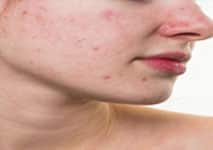
1. Acne: Chronic Stress can contribute to the development and exacerbation of acne in several ways. Increased release of hormones like cortisol can lead to an increase in sebum (oil) production in the skin. Excess sebum can clog pores and contribute to acne. Also inflammation and delayed healing caused by chronic stress can worsen acne lesions. People under stress may engage in unhealthy habits like picking at their skin, which can worsen acne and lead to scarring.
To manage stress-related acne, it’s important to address the root cause by managing stress itself.
Relaxation techniques, exercise, a health diet, and proper skincare can all play a role in reducing stress and improving skin health. Identifying the specific causative organisms can assist in selecting the right acne products for your needs.
2. Eczema and Psoriasis:
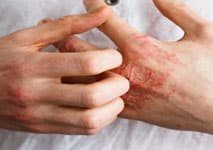
Eczema is a skin condition characterized by inflammation and irritation. Stress often triggers itchy rashes associated with eczema and worsens the itching, leading to scratching, potential skin damage, and infection.
Psoriasis, is a chronic autoimmune skin condition that causes a red, inflamed patches and plaques with thick, silvery scales on the skin. Stress is a common trigger for psoriasis flare-ups. Immune dysregulation provoked by chronic stress can potentially worsen psoriasis symptoms.
Managing stress is a crucial part of the treatments. To soothe the inflammation caused by eczema and psoriasis, it’s vital to restore and support a healthy skin barrier. Using a hypoallergenic, natural moisturizer can be highly beneficial, especially after a warm bath or shower.
3. Rosacea:
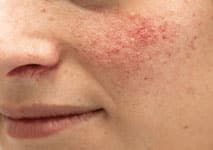
Rosacea is another skin condition that primarily affects the face and is characterized by redness, flushing, visible blood vessels, and sometimes the development of papule and pustules. Managing rosacea-prone skin can be challenging.
Both rosacea and seborrheic dermatitis-prone skin tend to have compromised skin barriers and heightened inflammatory responses. Stress can make the skin more sensitive and reactive, and is a common trigger for flare-ups.
Educating yourself about how to create a skincare routine tailored to calm, treat, and protect rosacea-prone and seborrhea-prone facial skin can be incredibly beneficial.
4. Neurodermatitis:
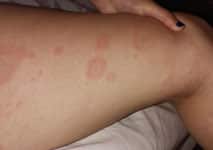
Neurodermatitis involves unexplained itching in specific areas that can lead to thick, scaly patches due to repeated scratching. While the exact cause remains unknown, stress is recognized as one of the triggers for this condition.
To alleviate the itchiness of neurodermatitis, it’s essential to keep the affected area well- with hypoallergenic moisturizers.
5. Reduced Blood Flow:
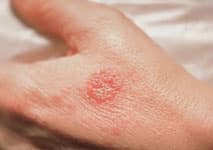
Chronic stress leads to an overall reduction in blood flow as the body redirects blood to essential organs as a survival mechanism. When blood flow in the skin diminishes, the exchange of nutrients and waste products is also limited, resulting in skin appearing pale, sunken, or even darkened in some areas. Dark circles under the eyes are one of the most noticeable effects of reduced blood flow. Under-eye creams formulated to brighten the skin and target vascular congestion, can be beneficial in reducing under-eye circles, bags, and puffiness caused by stress-induced blood flow issues.
Stress can also lead to increased sweating, intertrigo, and heightened body odor:

Acute stress rapidly stimulates sweat glands, with the intensity of stress directly affecting the degree of sweating. Stress sweat is notoriously challenging to conceal or mask with fragrances or other tricks, which can further add to your stress. Excessive sweating also makes the skin more susceptible to a red skin fold rash known as intertrigo.
The good news is that there are skincare steps, including maintaining good hygiene, and lifestyle changes you can implement to address intertrigo and reduce stress-induced body odor.
To address stress-induced skin problems, consider a holistic approach:
Skincare Routine: Establish a comprehensive skincare routine tailored to your specific skin issue to promote healing from the outside in.
Prescription Medications: Consult with a healthcare professional for prescriptions or treatments when necessary, such as cortisone creams, antibiotics for skin infections, or antihistamines for severe itching.
Lifestyle Modifications: Implement lifestyle changes to reduce overall body inflammation, including adopting a low-inflammatory diet, maintaining regular sleep patterns, engaging in suitable exercise, and practicing stress-reduction techniques like mindfulness.
Sun Protection: Protect your skin from the harmful effects of UV rays, which can worsen skin problems.
Consultation: Seek professional advice when dealing with chronic skin conditions aggravated by stress to receive personalized guidance on treatment and management
It’s worth noting that good self-care, including stress reduction, is becoming increasingly recognized as a crucial component of skincare and overall well-being. By addressing stress, you can not only improve your skin but also enhance your overall quality of life. Remember that reducing stress is the most effective method for alleviating stress-related skin symptoms, creating a healthier and more balanced you.
To schedule an in person on Tele-medicine appointment
please call our office at 1-212-794-8800 or email us at info@patientsmedical.com. We look forward to hearing from you
Our medical center in New York City.
Patients Medical PC 1148 Fifth Avenue, Suite 1B
New York, NY 10128
About Patients Medical
 PatientsMedical.com is headed by Dr. Rashmi Gulati, MD who is a board-certified physician with over 20 years of integrative, functional and internal medicine experience.
PatientsMedical.com is headed by Dr. Rashmi Gulati, MD who is a board-certified physician with over 20 years of integrative, functional and internal medicine experience.Patients Medical is a holistic wellness center dedicated to helping its clients discover health and rediscover vitality. Their physicians combine the best of conventional and holistic medicine with state-of-the-art equipment to provide comprehensive care and treatment to their patients. They focus on the root causes of secondary medical conditions, integrating modern medicine, holistic practices, and natural supplements to fast-track healing and prevent disease. Every year, thousands of existing and new patients continue to visit the center, seeking an alternative medical approach to a variety of health issues.
Patients Medical provides extensive weight loss support. For details see: Patientsmed, Mounjaro Weight Loss, Ozempic Weight Loss , Semaglutide For Weight Loss/, and Wegovy Weight Loss Patients Medical provides extensive reproductive medicine support through its affiliates. For details see: Surrogacy4All , Eggdonors4All and Indian Egg Donor .
In addition, Patients Medical provides access to over 15,000 affordable supplements on their affiliated website: MySupplements.store

Rashmi Gulati, MD, provides innovative, individualized health care that nurtures mind, body, and spirit. Since 2004 she has been the medical director at Patients Medical, where she delivers comprehensive personalized health care, treating each patient as a respected, unique individual. Through their integrative health care center in the heart of Manhattan, Dr. Gulati and her colleagues have become premier care providers serving patients locally and throughout the world.
About Patients Medical
PatientsMedical.com is headed by Rashmi Gulati, MD who is a board-certified physician with over 20 years of integrative, functional and internal medicine experience.
Patients Medical is a holistic wellness center dedicated to helping its clients discover health and rediscover vitality. Their physicians combine the best of conventional and holistic medicine with state-of-the-art equipment to provide comprehensive care and treatment to their patients. They focus on the root causes of secondary medical conditions, integrating modern medicine, holistic practices, and natural supplements to fast-track healing and prevent disease. Every year, thousands of existing and new patients continue to visit the center, seeking an alternative medical approach to a variety of health issues.
In addition, Patients Medical provides access to over 15,000 affordable supplements on their affiliated website: www.MySupplements.Store
Our medical center in New York City.
Patients Medical PC
1148 Fifth Avenue, Suite 1B
New York, NY 10128

